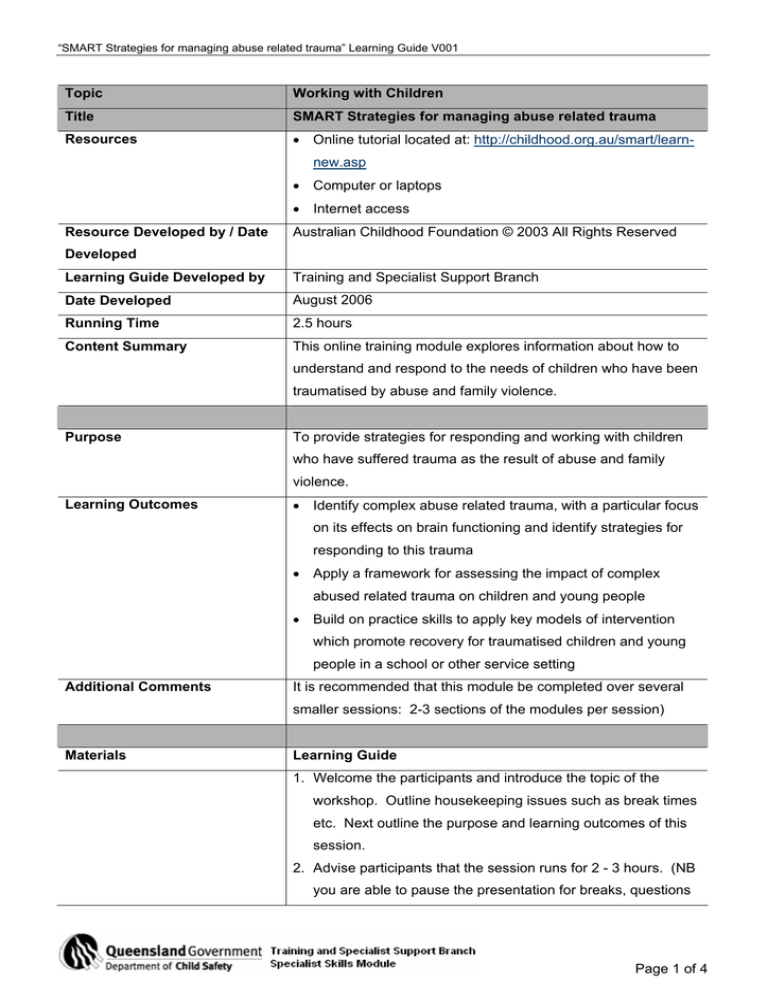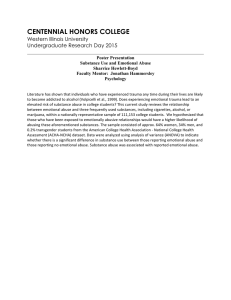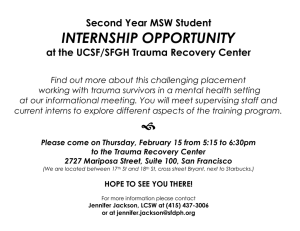
“SMART Strategies for managing abuse related trauma” Learning Guide V001
Topic
Working with Children
Title
SMART Strategies for managing abuse related trauma
Resources
• Online tutorial located at: http://childhood.org.au/smart/learnnew.asp
• Computer or laptops
• Internet access
Resource Developed by / Date
Australian Childhood Foundation © 2003 All Rights Reserved
Developed
Learning Guide Developed by
Training and Specialist Support Branch
Date Developed
August 2006
Running Time
2.5 hours
Content Summary
This online training module explores information about how to
understand and respond to the needs of children who have been
traumatised by abuse and family violence.
Purpose
To provide strategies for responding and working with children
who have suffered trauma as the result of abuse and family
violence.
Learning Outcomes
• Identify complex abuse related trauma, with a particular focus
on its effects on brain functioning and identify strategies for
responding to this trauma
• Apply a framework for assessing the impact of complex
abused related trauma on children and young people
• Build on practice skills to apply key models of intervention
which promote recovery for traumatised children and young
people in a school or other service setting
Additional Comments
It is recommended that this module be completed over several
smaller sessions: 2-3 sections of the modules per session)
Materials
Learning Guide
1. Welcome the participants and introduce the topic of the
workshop. Outline housekeeping issues such as break times
etc. Next outline the purpose and learning outcomes of this
session.
2. Advise participants that the session runs for 2 - 3 hours. (NB
you are able to pause the presentation for breaks, questions
Page 1 of 4
“SMART Strategies for managing abuse related trauma” Learning Guide V001
and then resume).
Computers/laptops
Internet access
3. Go to the internet site at the following address:
http://childhood.org.au/smart/learn-new.asp
4. Scroll down and complete the login and password page.
5. Follow the directions and prompts provided on the course
6. Read the Online Learning Modules page as it contains
important information on how to participate in the course.
7. You will need to work you way sequentially through each of
the 10 modules. Each module contains a mixture of slides,
audio tracks activities and knowledge checks that take 10
minutes to complete.
8. When the modules have been completed, reflect and discuss
using the following prompts:
What have you learnt from the session?
How can you apply this learning to your work with children
families and carers?
As a result of the course, is there anything that you will be
doing differently with children, families and carers in the
future?
Any other comments or questions?
9. Review the purpose and learning outcomes and then close
the session.
Page 2 of 4
Specialist Skills Module Completion Form
Directions:
1. When a training module has been completed, fill in this form with the details of the training
conducted and the participants.
2. The Team Leader or Senior Practitioner then signs the form to confirm that the listed
participants completed the training module.
3. Fax the form to the Training and Specialist Support Branch (3861-1823).
4. Provide the original completed form to the Business Support Officer in your CSSC.
5. The BSO will then file the form and keep a record of training completed by the CSSC staff.
6. The Team Leader or Senior Practitioner can then print out and sign a completion certificate
for each participant who attended the training.
Training and Specialist Support Branch
84 Kedron Park Rd, Wooloowin, 4030
Ph : 3861 1610
Fax : 3861 1823
Name of Specialist Skills
SMART Strategies for managing abuse related trauma
Module:
Child Safety Service Centre:
Participants names:
Date completed:
Team Leader or Senior
Practitioner signature:
1.
2.
3.
4.
5.
6.
7.
8.
9.
10.
11.
12.
13.
14.
15.
16.
Specialist Skills Training
“SMART Strategies for managing
abuse related trauma”
Presented to
____________________
This is to certify the above staff member has completed the online Specialist
Skills Training on Working with Children titled “SMART Strategies for managing
abuse related trauma”
_______ 20___
---------------------------------------------------------------------------------------------
Team leader / Senior Practitioner /
Manager
Child Safety Service Centre
Department of Child Safety




